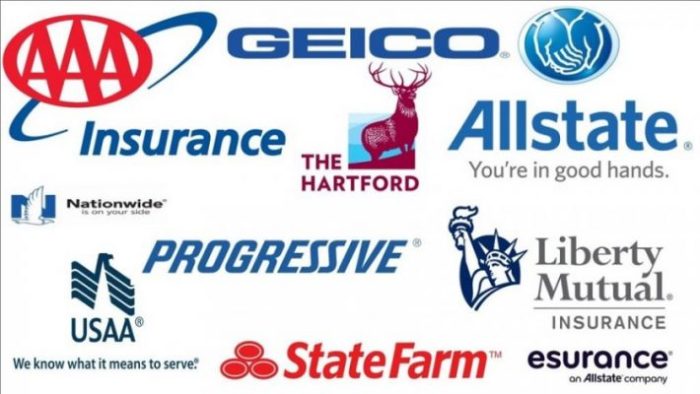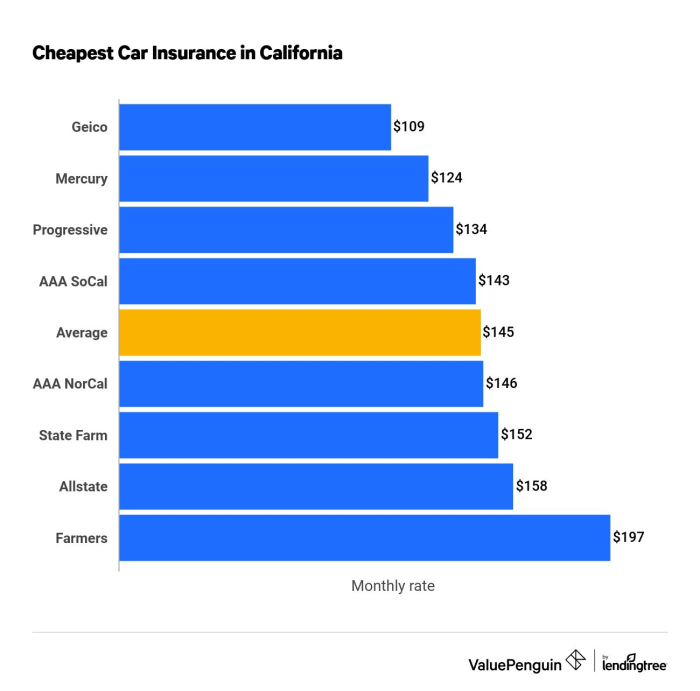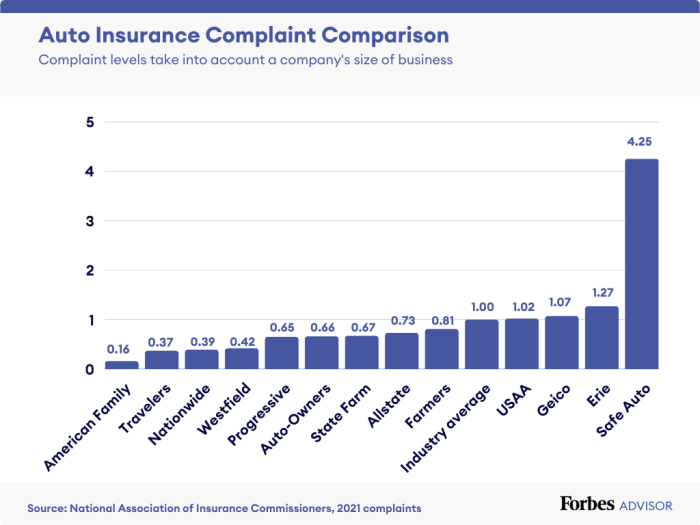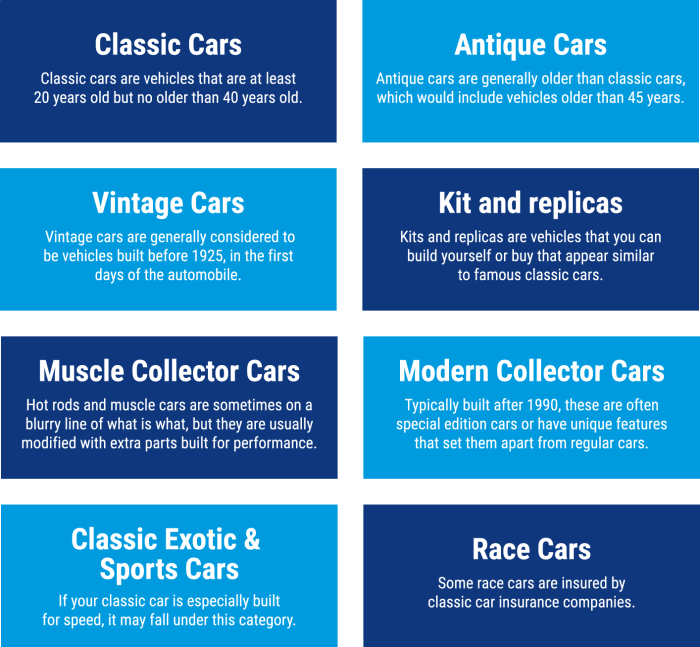What are the best auto insurance companies for classic cars? It’s a question that many classic car owners ask, and for good reason. These vehicles are more than just transportation; they’re investments, pieces of history, and often, a reflection of their owner’s passion.
Unlike modern cars, classic cars require specialized insurance that understands their unique value and needs.
Classic car insurance differs from standard auto insurance in several key ways. It takes into account the car’s age, condition, and value, offering coverage options that cater to the specific needs of these vehicles. For example, you’ll want to ensure you have coverage for restoration and customization, which are often essential for maintaining the value of a classic car.
Factors to Consider When Choosing an Insurer

Choosing the right auto insurance company for your classic car is crucial to ensure you have adequate coverage and peace of mind. You’ll want to consider a variety of factors beyond just price, as a classic car’s unique needs require specialized insurance.
The Value of Your Classic Car, What are the best auto insurance companies for classic cars?
The value of your classic car is a key factor in determining your insurance premium. Classic cars often appreciate in value over time, making them more expensive to insure than modern vehicles. It’s essential to choose an insurer that understands the unique value of your car and offers appropriate coverage.
You’ll need an insurer that offers agreed value coverage, which means they’ll pay you the agreed-upon value of your car in the event of a total loss, regardless of its current market value.
Driving Habits and Usage
Your driving habits and the frequency you use your classic car will also influence your insurance premium. If you only drive your car on weekends for pleasure, you’ll likely pay a lower premium than someone who drives their classic car daily.
Some insurers offer discounts for limited mileage or occasional use, so be sure to inquire about these options.
Discounts, Customer Service, and Claims Handling
There are a variety of discounts available for classic car insurance, such as:
- Safety Features:Some insurers offer discounts for classic cars equipped with anti-theft devices or other safety features.
- Garage Storage:If you store your classic car in a garage, you may qualify for a discount.
- Membership in Classic Car Clubs:Insurers may offer discounts to members of classic car clubs.
It’s also important to consider the insurer’s customer service and claims handling process. Look for an insurer with a good reputation for responsiveness and efficiency.
Getting Quotes and Choosing the Right Policy

Now that you’ve considered the factors that are most important to you, it’s time to start getting quotes from different insurance companies. This is a crucial step in finding the best coverage for your classic car at a price you can afford.
Obtaining Quotes from Different Insurance Companies
To ensure you’re getting the best possible deal, it’s recommended to obtain quotes from multiple insurance companies. This will allow you to compare coverage options, premiums, and other factors. Here’s how to go about it:
- Start with Online Quotes:Many insurance companies have user-friendly websites where you can get an instant quote by providing basic information about your classic car and your driving history. This is a convenient way to get a preliminary idea of pricing from several companies.
- Contact Insurance Agents:If you prefer personalized assistance, reach out to insurance agents who specialize in classic car insurance. They can guide you through the process, answer your questions, and provide tailored quotes based on your specific needs.
- Explore Specialty Classic Car Insurers:Some insurance companies focus specifically on insuring classic cars. These companies often have a deeper understanding of the unique needs of classic car owners and may offer specialized coverage options and competitive rates.
Comparing Quotes and Understanding Policy Terms
Once you have quotes from multiple companies, it’s time to compare them carefully. This process involves more than just looking at the bottom line premium. Pay attention to the following factors:
- Coverage Limits:Ensure the coverage limits are sufficient to cover the full value of your classic car in case of an accident or theft. Consider the cost of repairs, replacement parts, and potential depreciation.
- Deductibles:Higher deductibles typically result in lower premiums. Determine the deductible amount you’re comfortable with, considering your financial situation and the potential cost of repairs.
- Exclusions:Read the policy documents carefully to understand any exclusions, such as specific types of damage or driving situations that are not covered. For example, some policies may exclude coverage for racing or track events.
- Discounts:Inquire about available discounts, such as safe driving discounts, multi-car discounts, or discounts for garage storage. These discounts can significantly reduce your premium.
Reading Policy Documents Carefully
Don’t be intimidated by the length of insurance policy documents. They are essential for understanding the details of your coverage. Take your time to read through them carefully, paying particular attention to the following sections:
- Declarations Page:This page summarizes your policy, including your name, address, vehicle information, coverage limits, deductibles, and premium amount.
- Coverage Provisions:This section Artikels the specific types of coverage included in your policy, such as liability, collision, comprehensive, and uninsured motorist coverage.
- Exclusions and Limitations:This section details situations or events that are not covered by your policy, such as racing, driving under the influence, or certain types of damage.
- Conditions:This section Artikels your responsibilities as a policyholder, such as reporting accidents promptly, cooperating with the insurance company, and maintaining your classic car in good condition.
Maintaining Coverage and Claim Procedures

Keeping your classic car insured means more than just paying your premiums. It also involves taking steps to ensure you have the right coverage and understanding the claim process in case of an accident or damage.
Maintaining Accurate Records
Maintaining accurate records of your vehicle’s maintenance and repairs is crucial for several reasons. First, it helps you demonstrate the value of your classic car to your insurer, especially if you need to make a claim. Second, it can help you avoid disputes with your insurer regarding the cause of damage or the cost of repairs.
Finally, accurate records can help you keep track of your vehicle’s history and identify potential problems early on.
- Keep all receipts for maintenance and repairs, including work done by yourself.
- Maintain a logbook or file where you record all repairs, including dates, descriptions, and costs.
- Store your records in a safe and organized manner, preferably in a fireproof safe or a secure online storage system.
Filing a Claim
If you’re involved in an accident or your classic car is damaged, it’s important to file a claim with your insurer promptly. The following steps can help you navigate the claims process smoothly:
- Contact your insurer as soon as possible.Most insurers have 24/7 claims reporting services. Be prepared to provide information about the accident or damage, including the date, time, location, and any other relevant details.
- Gather evidence.Take photos of the damage to your car and the accident scene, if applicable. Get the contact information of any other parties involved in the accident, including witnesses.
- Follow your insurer’s instructions.Your insurer may require you to take your car to a specific repair shop or provide additional documentation. Be sure to follow their instructions carefully to avoid delays in processing your claim.
Navigating the Claims Process
The claims process can be complex, but there are steps you can take to ensure a smooth experience:
- Be patient.The claims process can take time, especially if the damage is extensive. Be patient and communicate with your insurer regularly to stay informed about the progress of your claim.
- Be prepared to provide documentation.Your insurer may require you to provide documentation such as police reports, repair estimates, and receipts for maintenance and repairs. Be prepared to provide these documents promptly.
- Be polite and professional.Communicate with your insurer in a polite and professional manner. This will help to ensure that you receive the best possible service.
Conclusion

Choosing the right insurance for your classic car is crucial. By understanding the key features of classic car insurance, comparing quotes from reputable companies, and carefully reviewing policy terms, you can find the best coverage for your beloved vehicle.
Remember, insurance is about peace of mind, allowing you to enjoy your classic car knowing it’s protected against the unexpected.
FAQ Explained: What Are The Best Auto Insurance Companies For Classic Cars?
What is agreed value insurance?
Agreed value insurance sets a predetermined value for your classic car, which is the amount you’ll receive in the event of a total loss. This ensures you get the full value of your car, even if it’s worth more than its actual cash value.
How much does classic car insurance typically cost?
The cost of classic car insurance varies depending on factors like the car’s value, your driving history, and the coverage you choose. It’s best to get quotes from multiple companies to compare prices.
What are some common discounts available for classic car insurance?
Many insurers offer discounts for things like safe driving records, garage storage, low annual mileage, and membership in classic car clubs.
